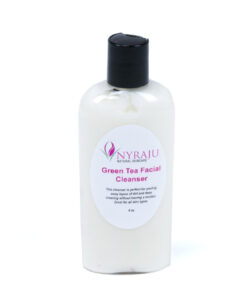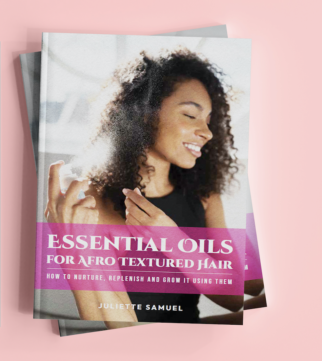 You’ve carefully applied your foundation; you’ve finished off with that gorgeous, sheer powder your girlfriend told you about. Yes, you are looking mighty fine and you are out the door.
You’ve carefully applied your foundation; you’ve finished off with that gorgeous, sheer powder your girlfriend told you about. Yes, you are looking mighty fine and you are out the door.
Two hours later when you pop into the ladies’ room, it’s a whole other story: your foundation has left the building and your face is as oily as a mackerel. Darn.
It’s the make-up, you say; you decide it’s blocking your pores and making you sweat, so you swear off cosmetics and go bare-faced, only to find the shine is still on you like white on rice.
Don’t fret – there are some solutions, and some very real benefits to having oily skin. Black skin has higher melanin levels – our inbuilt sun protection – and generally speaking, we have larger pores than people of other ethnicities. As a result, our skin produces more sebum/oil, and it is that natural oil that makes our skin age more slowly and wrinkle significantly less. So, happily, black don’t crack, but it sure does up the Shine Factor and in many cases, the Acne Factor.
Let’s look at answers to the Shine Factor. How does one minimize the shine on African-American skin?
Choose your facial cleansers and moisturizers with care
- Make sure your cleanser/moisturizer is formulated for oily skin, and free of parabens and sulfates.
- Avoid products that contain alcohol – they will dry out your skin, which leads it to produce more oil to compensate.
- Wash your face in cold or lukewarm water.
- Don’t over-wash or scrub.
- Always wash off make-up before going to bed.
- Remember: if you live in a humid climate, you may consider skipping moisturizer altogether.
- Keep your facial skincare products (moisturizers, serums etc) in the fridge. Not only will they cool the face down upon application, they will also maintain their potency/integrity longer.
Use a good primer before applying foundation
- Primers really do work by grabbing onto foundation and holding it in place for longer. A good primer may also minimize the appearance of pores.
Use oil-free, non-comedogenic (non-pore- clogging) and dermatologist-tested cosmetics/skincare products
-
- Avoid mineral or silicone-based products; they can make your face look flawless, but they tend to clog pores/cause sweat and shine, particularly in humid conditions.
Look for liquid foundations, or apply cream foundations with a clean, damp foundation brush or sponge. Don’t apply foundation with hands – the heat from your fingers can cause premature oiling (or transfer bacteria which may lead to acne).
What about reducing acne on adult black skin?
Acne is a many-headed beast: it can be non-inflammatory (blackheads and whiteheads) or inflammatory (papules, nodules, pustules and cysts); it may be caused by skin type, hormonal changes, medications, bacterial infections, diet and cosmetics. I tend to advise a consultation with a dermatologist when trying to treat acne because you can spend a tremendous amount of time and money (and irritate or damage your skin further) in your attempts to resolve the condition.
For black people, acne is especially problematic because we are very prone to hyperpigmentation, which often comes from acne scarring. This secondary problem can be just as distressing and frustrating as the first.
To combat acne and acne scarring, follow the tips for dealing with the Shine Factor, and also incorporate the following:
Keep your hands off your face
- If you must scratch, use a knuckle or a clean Q-Tip. Change face towels and pillowcase regularly – and if necessary, cover your hair at night. Hair products can be a major contributor to facial acne.
Eat a well-balanced diet
- You know the drill: plenty of water and green, leafy vegetables. Ditch the fat (fried foods taste like heaven, but they can quickly and directly affect the condition of your skin) and sugar (can cause acne and wrinkles!). Cut down on dairy (reported to be an acne trigger for many people).
Don’t pick or squeeze your spots!
- Picking can deposit bacteria from under your fingernails. (Some dermatologists agree that whiteheads can be extracted safely at the right time using a sterilized tool, designed for the purpose, however.)
Don’t smoke! And try and keep stress to a minimum
- Smoking reduces effective blood circulation and good blood circulation is essential to the healing of any skin condition.
Scar and spot removal? Steer clear of over-the-counter (OTC) hydroquinone products
- Many OTC spot-fading products contain unsafe amounts (in excess of 2%) of hydroquinone or even mercury. Such products are banned in the USA. Look for natural alternatives that contain lighteners such as kojic acid, alpha arbutin, bearberry extract and mulberry extract.
- Consider home remedies for fading spots: lemon juice, aloe vera and turmeric are all gentle and effective lighteners.
That’s it for this week. As always …
Dedicated To Your Beauty,
Juliette Samuel
Esthetician/Author/Publisher




 Facebook
Facebook Twitter
Twitter Delicious
Delicious Digg
Digg Myspace
Myspace StumbleUpon
StumbleUpon Youtube
Youtube